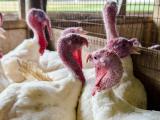Nov 22, 2004 (CIDRAP News) – The Sri Racha Tiger Zoo in Thailand reopened Nov 18, one day after Thai authorities reported a final tally of 102 tigers lost in the zoo's outbreak of H5N1 avian influenza.
In a follow-up report to the World Organization for Animal Health (OIE), authorities said 102 tigers died of illness or were euthanized in the past month at the zoo near Bangkok. Tigers fell sick after eating the carcasses of chickens later found to be infected with H5N1 avian flu.
All necessary controls have been put in place and samples have been collected from all susceptible animals, from zoo staff, and from the grounds, the report said.
About 1,000 people visited the zoo Nov 18, its first day back in business since the outbreak forced the zoo to close, according to a Nov 18 story by the Thai News Agency. Admission was free, but visitors face new rules that keep them farther away from the tigers and bar them from picking up tiger cubs. The zoo's official reopening is scheduled for Nov 27.
Elsewhere in Thailand, avian flu killed hundreds of pigeons at schools in Sukhothai province's Thung Saliam district, prompting panic among local residents, the Bangkok Post reported Nov 19.
Bird carcasses had been found Nov 5 at a primary school and a nearby kindergarten. Tests confirmed on Nov 17 that the pigeons had been exposed to avian flu, heightening fears of transmission to students. Two schools with 500 students were closed, the newspaper reported, adding that none of the students appeared to have symptoms, but authorities were monitoring them.
A local health official called the school closings an overreaction, the newspaper story said. Volunteers were instructing people in the district not to touch the dead birds and to avoid entering affected areas without proper protective gear.
In Vietnam, authorities are investigating the deaths of more than 3,000 ducks in the central province of Binh Thuan, the Chinese news agency Xinhua reported today. The ducks reportedly had swollen heads, paralyzed legs, and exhaustion, according to the news agency's summary of local press reports.
One newspaper, Vietnam Agriculture, characterized the ducks as having cholera, the Xinhua reported. A local veterinarian said samples from the affected ducks were being tested, but added that they showed no signs of avian flu.
Xinhua also reported that Vietnam had found 20 chicks infected with H5 influenza in mid-November in Can Tho city. However, the OIE Web site's most recent report on avian flu outbreaks in Vietnam is from Oct 22.
See also:
OIE update on avian flu in animals in Asia
http://www.oie.int/downld/AVIAN%20INFLUENZA/A_AI-Asia.htm



















